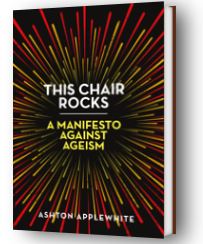I’m barely back from a tour of Australia sponsored by EveryAGE Counts, their terrific national anti-ageism campaign. It was fascinating to look from another continent at how views on age and age bias are changing around the world.
While I was in Oz, the #OKBoomer meme broke the internet—ageland’s little corner of it, at least. One accelerant was the use of the phrase in Parliament by a young New Zealand politician, Chloë Swarbrick, to rebut an older colleagues after the man heckled her during a speech about the climate crisis. As Swarbrick explained in a subsequent essay in the Guardian, the remark was an “off-the-cuff, albeit symbolic of the collective exhaustion of multiple generations set to inherit ever-amplifying problems in an ever-diminishing window of time.”
Every generation points fingers at the one that came before it and finds fault with the generation that follows (“kids these days”). But young people are coming of age at a time of profound uncertainty, in anxious times we look for scapegoats, and they do have it harder than their parents did. I was born in 1952, right in the middle of the bulge in the proverbial python. Youngers have many reasons to envy my generation’s extreme demographic good fortune, and it is tempting to frame us as the enemy. The song that started it all described boomers as racist, fascist Trump supporters with bad hair. It’s tempting to rise to that hateful bait—ageism cuts both ways—or to go on the defensive. Then everyone loses, and the planet smolders. Bushfires destroyed millions of acres during my few weeks in Australia.
The old are not the enemy and age is not the issue. As historian Holly Scott pointed out in the Washington Post, the problem with #OKBoomer is that “generational divides distract from deeper questions of power.” And privilege. The issue is inequality, which does not discriminate by age. What stands between us and a more equitable world are the structures and systems that benefit from oppression—racism, sexism, ageism and all the rest—because prejudice pits us against each other in order to maintain the status quo. Like auto workers in the US competing against auto workers in Mexico instead of organizing for better wages, pitting young against old is a time-honored tactic used to divide people who might otherwise unite to change things.
OK, boomers: it’s time to reach across the “generational divide,” itself a myth promoted by the mainstream media. It’s time to really listen to what youngers have to say and figure out how to work together. It’s time to act like ancestors—because the stakes have never been higher.
By Ashton Applewhite
 Learn more by reading This Chair Rocks, by Ashton Applewhite.
Learn more by reading This Chair Rocks, by Ashton Applewhite.
(Click the book for purchase information.)


